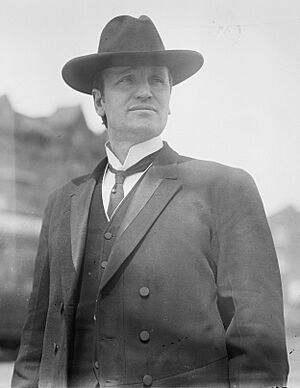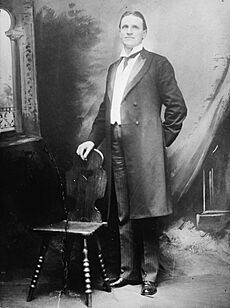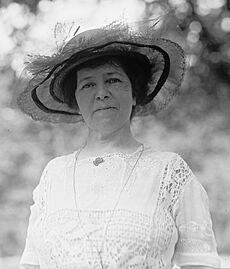Henry F. Ashurst facts for kids
Quick facts for kids
Henry F. Ashurst
|
|
|---|---|
 |
|
| United States Senator from Arizona |
|
| In office March 27, 1912 – January 3, 1941 |
|
| Preceded by | Seat established |
| Succeeded by | Ernest W. McFarland |
| Personal details | |
| Born |
Henry Fountain Ashurst
September 13, 1874 Winnemucca, Nevada, U.S. |
| Died | May 31, 1962 (aged 87) Washington, D.C., U.S. |
| Nationality | American |
| Political party | Democratic |
| Spouse | Elizabeth McEvoy Reno |
| Alma mater | Stockton Business College University of Michigan Law School |
Henry Fountain Ashurst (September 13, 1874 – May 31, 1962) was an American Democratic politician. He was one of the very first two senators from Arizona. Henry Ashurst taught himself a lot of what he knew. Before becoming a senator, he worked as a district attorney and was part of Arizona's local government. He achieved his childhood dream of joining the United States Senate. During his time in the Senate, Ashurst led important groups like the Committee on Indian Affairs and the Judiciary Committee.
People often talked about Ashurst's political career. He was known for sometimes changing his mind on votes. He also used a lot of very long words, which earned him nicknames like "Five-Syllable Henry." He loved public speaking and was considered one of the best speakers in the Senate. Some even called him the "Silver-Tongued Sunbeam of the Painted Desert."
Contents
Early Life and Education
Henry Ashurst was born on September 13, 1874, in a wagon near Winnemucca, Nevada. He was the second of ten children. When he was two, his family moved to a ranch near Williams, Arizona. He went to school in Flagstaff. When he was only ten years old, he wrote "Henry Fountain Ashurst, U.S. Senator from Arizona" in his school book. This showed his early dream to become a senator.
He left school at age thirteen and worked as a cowboy on his father's ranch. At nineteen, Ashurst became a turnkey (someone who manages keys and prisoners) at the county jail in Flagstaff. While working there, he became interested in law by reading law books. Later, he worked at a lumber yard and studied law at night. In 1895, he worked as a lumberjack and a construction worker. He then went to Stockton Business College and finished in 1896. Ashurst became a lawyer in 1897 and started his own law practice in Williams. He also spent a year studying at the University of Michigan Law School starting in 1903.
In 1904, Ashurst married Elizabeth McEvoy Reno. She was from Ireland and had four children from her first marriage. Elizabeth moved to Flagstaff to set up and manage a weather station. She was a very important advisor to him throughout his political career.
Arizona's First Senator
Ashurst began his political journey in 1897 when he was elected to Arizona's local government, the Territorial House of Representatives. He was elected again in 1899 and became the youngest person to lead the House as its speaker. In 1902, he was elected to the Territorial Senate. He also served as the main lawyer for Coconino County from 1905 to 1908.
In 1911, Henry Ashurst led Arizona's meeting to write its constitution. During this time, he was careful to avoid arguments over different parts of the constitution. This helped him get ready for a U.S. Senate seat.
When Arizona officially became a state in 1912, Ashurst was chosen by the Arizona legislature as one of the state's first two senators. He started his job on April 2, alongside Marcus A. Smith. He was re-elected easily in 1916, and then again in 1922, 1928, and 1934. He served for almost 29 years! He tried to be re-elected in 1940 but lost in the first round of voting for his party.
In his early years in the Senate, Ashurst supported President Woodrow Wilson. He led the Committee on Indian Affairs from 1914 to 1919. Later, when his party lost control of the Senate, Ashurst became a critic of the opposing party's leaders. When his party regained control in 1932, Ashurst became the head of the Judiciary Committee. He held this position until he left the Senate in 1941.
While in office, Ashurst focused on what the people of Arizona needed. He once said that people sent him to Washington to represent them, not for big international issues. Instead, they would ask him about their pensions or jobs for their children. He always read letters from Arizona, but usually ignored letters from other states.
When he ran for re-election, Ashurst often used a favorite quote: "Praise undeserved is scandal in disguise." He would admit his own faults to voters while praising his opponents. In the 1934 election, he even told people, "If you don't send me back to the Senate, you'll have an old broken down politician on your hands, and you don't want that." Arizona voters liked Ashurst a lot. He won by a huge amount in 1934.
After serving five terms, Ashurst lost the election in 1940 to Ernest McFarland. After his defeat, he gave a farewell speech to the Senate. Many senators and representatives came to listen. Ashurst spoke about what it felt like to lose. He said that at first, you feel like the world has fallen apart. But then, a feeling of peace and joy comes over you.
Oratory and Speaking Style
Henry Ashurst loved to speak in public. He once said, "I simply love speaking." This love, combined with his polite manners and perfect clothing, made him known as a very elegant speaker in the Senate.
The New York Times newspaper said that Ashurst was a great example of pure speaking skill. They noted that he could speak about many different topics, from funny stories to serious remarks, without losing his amazing way with words.
Ashurst developed his speaking skills from a young age. He practiced by reading speeches from famous speakers and shouting the words to the plants and rocks around him. He also read many classic books to learn as many quotes as possible. Because of this, by the time he joined Congress, he had a strong speaking voice and knew many quotes in both English and Latin. He also loved learning about where words came from, which helped him build a huge vocabulary.
Ashurst once said, "I love words that sound like gold, and nothing makes me happier than finding special words in the dictionary that might not otherwise be used."
One of Ashurst's most famous speeches was on June 15, 1935. He strongly criticized another senator, Huey Long. Time magazine called it "one of the most powerful speeches the chamber ever heard." Other important speeches by Ashurst included one about a judge's nomination in 1937, a tax on imported copper in 1932, and the United States joining World War I in 1917.
Senator Barry Goldwater liked Ashurst's speeches so much that he put fourteen of them into a book. Ashurst joked, "But, Barry, I made over 5,000 of them."
Retirement and Later Life
In his farewell speech, Ashurst said he planned to go back to Arizona. He imagined enjoying the quiet desert nights, the blooming cactus, and wandering through the Petrified Forest. However, he instead took a job on the U.S. Board of Immigration Appeals from 1941 until he retired in 1943.
After his retirement, Ashurst lived in Washington, D.C. He spent his time reading classical poetry and giving public speeches. He also appeared in public a few times. Ashurst was a contestant on the TV game show The $64,000 Question. He missed a question but won a Cadillac car as a prize. He also had a small role in the movie Advise and Consent, playing "Senator McCafferty." Ashurst had a stroke on May 15, 1962, and passed away on May 31, 1962.
Ashurst kept a journal from 1910 to 1937. It included descriptions of other senators. This journal was later published as a book called A Many Colored Toga.
See also
- List of United States senators from Arizona
 | Percy Lavon Julian |
 | Katherine Johnson |
 | George Washington Carver |
 | Annie Easley |



